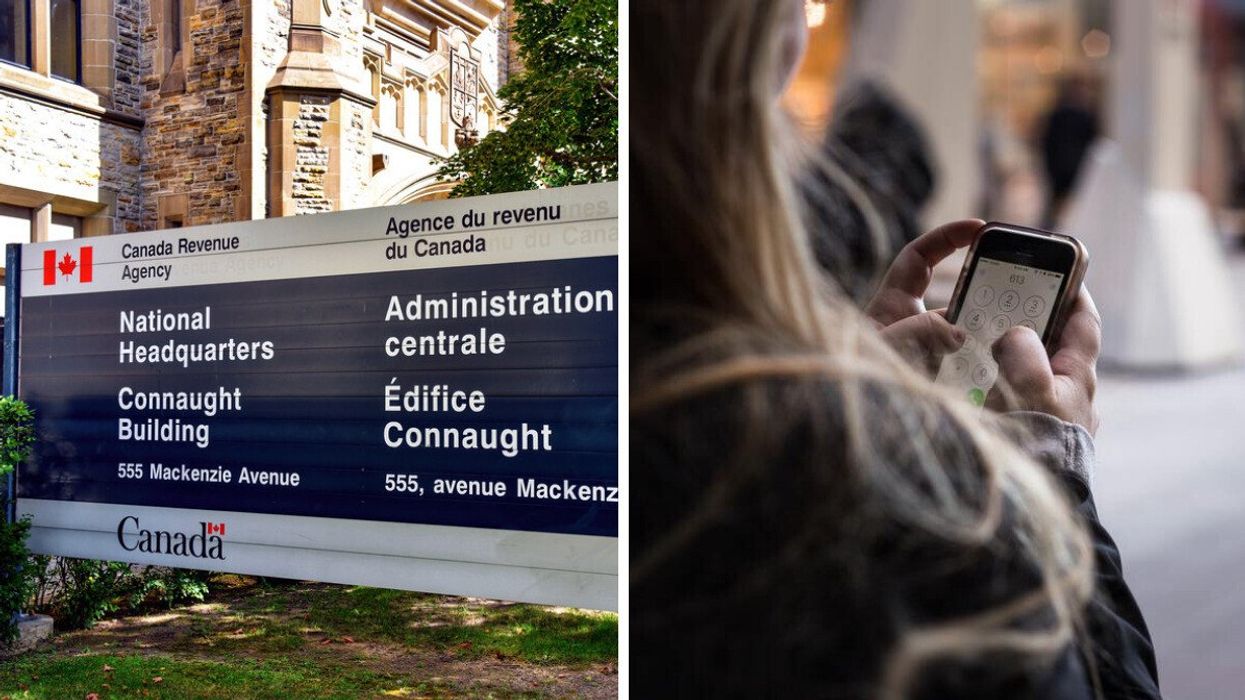Here's How Canadians Can Avoid Getting Duped By Scammers Posing As The CRA This Tax Season
And how to tell if it's really the CRA calling.👇🇨🇦

The Canada Revenue Agency in Ottawa. Right: A person dials on a phone.
Tax season in Canada is here, and many Canadians may be contacted by the Canada Revenue Agency about their tax returns.
However, with scammers continuing to pose as the CRA in an attempt to dupe Canadians into giving away money and personal info, the agency is warning residents about what to look for so they can avoid getting tricked.
The Government of Canada warns that taxpayers should be cautious if they receive any communication claiming to be from the CRA, especially those that request personal details like your social insurance number or credit card information.
"Scams may insist that personal information is needed so that you can receive a refund or a benefit payment," says the government.
Scammers may also try to direct you to a fake website in order to gain your personal information.
Will the Canada Revenue Agency ever call you?
The CRA might call you if they're reviewing your income tax and benefit return. According to the agency, you could get either a letter or a phone call telling you that the CRA is reviewing your return.
There are certain things you can look for to tell if it's really the CRA calling. For instance, the CRA will never demand immediate payment, including through means like Interac e-transfer, prepaid credit cards, or gift cards.
The agency also won't leave you threatening voicemails, like those threatening you with arrest or with sending the police.
Some things that the CRA might do include verifying your identity by asking for details like your full name, date of birth, or social insurance number.
If you're suspicious though, the agency has shared how you can make sure you're actually speaking with a CRA employee before handing over any personal information.
First, you'll want to tell the caller that you want to verify their identity. The CRA says you should request and make note of their name, phone number and office location.
Once you've done that, hang up. You can then check that the information given to you is true by contacting the CRA at its official phone number, 1-800-959-8281 (or 1-866-426-1527 for those living in the territories).
After you've verified the info, you can call the employee back.
Current CRA scams in Canada
The CRA has shared current phone and email scams that Canadians should be on the lookout for.
One example is of a call from scammers that appear to be from the CRA because of an altered caller ID.
If you receive a call that says it's from the CRA, the agency warns that you should be wary and verify that the call is genuine before providing any personal information.
Another current phone scam is extortion calls from scammers claiming to be the CRA.
According to the agency, the scammers will call you from a fake number that appears to be legitimate. They then might ask you to confirm your social insurance number and demand payment from you, either by Bitcoin or gift cards.
Another one of the latest scams sees fraudsters send Canadians an email message impersonating the CRA and offering fake refunds.
The email will state that the CRA owes you a refund and direct you to a link where you'll be asked to share personal information like SIN and date of birth, as well as online banking information.
An easy way to spot the scam is to remember that the CRA won't ask you by email for your personal information or bank information.
Scams can also occur by mail or text message, so it's always best to check with the CRA before trusting any communication you think is suspicious.
If you've been a victim of fraud, or have been tricked into sharing your personal or financial information with scammers, the CRA says you should report the scam by contacting the Canadian Anti-Fraud Centre, as well as contact police and your financial institution.